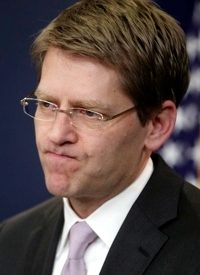
Last year congressional Democrats attempted to pass the DISCLOSE (Democracy Is Strengthened by Casting Light On Spending in Elections) Act, which would have required disclosure (hence the strained acronym) of large donors to organizations engaging in political activities, giving the Federal Elections Commission the power to regulate political speech on the Internet, and prohibited federal contractors from donating to political causes. Though the bill passed the House of Representatives, it twice failed to overcome procedural hurdles in the Senate, dooming it to well-deserved defeat.
Never ones to let established constitutional and parliamentary procedures get in the way of implementing a desired policy, Democrats are now considering resurrecting a portion of the DISCLOSE Act via executive order. White House Press Secretary Jay Carney (pictured) told reporters that the Obama administration has a draft proposal for “an executive order that would force government contractors to disclose their donations to groups that participate in political activities,” according to the Washington Post. The newspaper reports that Carney said the administration is considering this order in the interest of “transparency and accountability” and, naturally, “denied that the order was related to politics” even though it is conveniently being proposed just as Obama launches his reelection bid.
Yet it is hard to see anything but politics in this move. It would, after all, put the political contributions of those seeking federal contracts front and center in the contracting process, which already is hardly immune from the vagaries of politics. As Stan Soloway, president of the Professional Services Council, a trade coalition of about 350 federal contractors, told the Post: “The draft order says it is necessary to ensure that politics are not allowed to impair the integrity of the procurement process. But by force-feeding irrelevant information to government contracting officers, who would otherwise never consider such factors in a source selection, the rule would actually do precisely what it is intended to stop: inject politics into the source selection process.”
Similarly, Senate Minority Leader Mitch McConnell (R-Ky.) said: “Just last year the Senate rejected a cynical effort to muzzle critics of this administration and its allies in Congress. Now, under the guise of ‘transparency,’ the Obama administration reportedly wants to know the political leanings of any company or small business, including those of their officers and directors, before the government decides if they’ll award them federal contracts.” [Emphasis in original.]
Moreover, as McConnell pointed out, there is a clear underlying motive to the order, and it is the same motive the Democrats had in trying to pass the DISCLOSE Act. The Post noted that the DISCLOSE Act “was part of a broader effort by Democrats and the White House to limit the influence of interest groups, which played an expanded role in last year’s midterm elections” after the Supreme Court ruled in Citizens United v. Federal Elections Commission that corporations, unions, and nonprofit organizations have the right to participate in political advocacy. “Many interest groups were formed last year to spend millions of dollars on the elections,” said the paper, “and most of the money was spent on campaign commercials that were against congressional Democrats.” It doesn’t take a political science degree to figure out why Democrats would want to force these groups’ donors out into the open.
The proposed executive order would tend to steer political contributions from current or potential federal contractors toward those candidates the businesses believed would win rather than toward those they might actually favor, in hopes of getting preferential treatment from the government. It could also inhibit businesses’ contributing to opponents of those currently in power for fear of reprisal. Both of these outcomes would have the effect of favoring incumbents, which may explain congressional Democrats’ enthusiasm for the DISCLOSE Act last year when they still had a majority in both houses of Congress and Obama’s consideration of this order just after announcing his intention to seek reelection.
This order, if enacted, is an attempt on the administration’s part both to circumvent the legislative process and to silence opponents. The President should not sign it. If he does, Congress should act to overturn it through legislation. DISCLOSE by any other name still smells as sour.
Photo: Press Secretary Jay Carney briefs reporters at the White House in Washington, Tuesday, April 12, 2011.: AP Images



